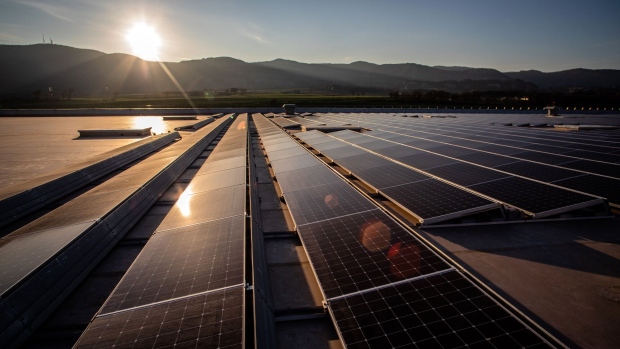Mar 28, 2023
Cost of Energy Transition So Low ‘You’ll Need Magnifying Glass’
, Bloomberg News

(Bloomberg) -- Every asset class is likely to be affected by the impacts of climate change, with the speed of the transition rather than the cost becoming the key issue, according to Nick Stansbury, the head of climate solutions at Legal & General Investment Management.
“The energy transition is one of the most important and underrated drivers of future asset prices,” he said. “We struggle to find a financial instrument somewhere in the world that won’t be affected in some way by climate change and the energy transition.”
The £1.2 trillion ($1.5 billion) asset manager said on Wednesday it’s done a “root-and-branch review” of all its climate scenarios and found that it would actually cost a “statistically insignificant amount” to limit the increase in global temperatures to less than 2C. That outcome could be achieved for the equivalent of as little as 1 basis point of global GDP per month over the next quarter century, LGIM estimates.
The transition to a net-zero economy and energy system will be the greatest economic overhaul of modern times and will create winners and losers. For investors, the risk and opportunities are manifold, with some industries winding down while others emerge.
LGIM, which is the investment arm of Legal & General Group Plc, said it has “consistently underestimated the pace of cost and efficiency improvements in low-carbon energy technologies.”
Meanwhile the UK, where LGIM is based, is “strikingly unprepared” for a changing climate and could face disruptions to energy, food supply, transport and communications infrastructure if it fails to adapt fast, the government’s independent adviser on climate policy has warned.
Britain is already experiencing the effects of a “lost decade” in planning for extreme weather events and other risks associated with a warming planet, the Climate Change Committee said in its biennial review of the government’s efforts. “There is no option but to adapt to the change in the climate. The question is only whether we do that well by doing it early, or wait until later when it will cost more, with greater disruption and greater problems,” said Chris Stark, who heads the independent body.
Transitioning to below 2C “would be so cheap it wouldn’t affect long-term economic output to any significant extent,” LGIM said. In fact, “the cost of transitioning is no longer an especially relevant factor” and instead focus should shift to “the speed at which capital can be deployed into low carbon energy systems.”
But the window in which to achieve a 1.5C outcome consistent with net-zero emissions by 2050, the so-called stretch goal of the Paris climate accord, “is closing fast” with 2022 “being yet another year of largely inadequate action,” LGIM said.
The global economy will save about $19 trillion by 2050 if the transition process begins in earnest today instead of 2030, according to LGIM. And for investors, the speed and nature of the transition pose significant potential volatility for portfolios, Stansbury said.
(Recasts top to lead on asset classes and speed of transition, adds reference to climate change committee)
©2023 Bloomberg L.P.


